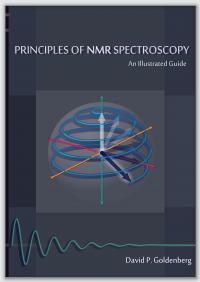Principles of NMR Spectroscopy
Principles of NMR Spectroscopy
By: David Goldenberg
With nearly 400 original illustrations, this NMR primer provides an introduction to solution NMR spectroscopy at a level appropriate for advanced undergraduates, graduate students and working scientists with backgrounds in chemistry or biochemistry.
For all sales outside of the United States, please contact Felicity Henson, fhenson@aip.org
Title information
With nearly 400 original illustrations, this NMR primer provides an introduction to solution NMR spectroscopy at a level appropriate for advanced undergraduates, graduate students and working scientists with backgrounds in chemistry or biochemistry. It presents the underlying physics and mathematics in a way that is both accessible and sufficiently complete to allow a real understanding of modern multi-dimensional experiments, thereby giving readers the tools they need to move to more advanced textbooks and articles.
One special feature of this text is a thorough, but accessible, treatment of spin quantum mechanics, including scalar-coupled spins. A novel style of vector diagram is used to represent the quantum correlations between coupled spins and the manipulation of these correlations by pulses and time evolution. This will help to clarify what is arguably the most difficult aspect of NMR for students and practitioners to master.
1. An overview of modern solution NMR
2. An introduction to spin and nuclear magnetism
3. Early NMR experiments
4. Chemical information from resonance frequencies
5. The pulse NMR methods: The pulse
6. The pulse NMR method: The signal and spectrum
7. Relaxation
8. A more mathematical look at relaxation
9. Cross relaxation and the nuclear Overhauser effect
10. Two-dimensional NMR experiments
11. The mathematical formalism of quantum mechanics
12. More quantum mechanics: Time and energy
13. Quantum description of a scalar-coupled spin pair
14. NMR spectroscopy of a weakly-coupled spin pair
15. Two-dimensional spectra based on scalar coupling
16. Heteronuclear NMR techniques
17. Introduction to the density matrix
18. The product-operator formalism
Appendix A: List of symbols, numerical constants and abbreviations
Appendix B: Trigonometric functions and complex numbers
Appendix C: Fourier series and transforms
Appendix D: Vectors and matrices
Appendix E: Mathematics for uncoupled spin-1/2 particles
Appendix F: Mathematics of the two-spin system
Index
|
“The Goldenberg book is ideal for upper division undergraduate students with majors in Chemistry, Biology and related areas. It instills an intuitive picture of NMR without sacrificing rigor when needed.” “A very valuable reference for anyone involved in NMR spectroscopy, including the serious newcomer who wants to learn the field and the seasoned expert looking for a fresh view of fundamental ideas.” “Clear and accessible, Goldenberg’s book is written in an engaging style such that you feel more like you’re reading a story than being taught a discipline. I particularly enjoyed his approach of interweaving the classic experiments and quantum mechanics, which is maintained throughout the book.” |

